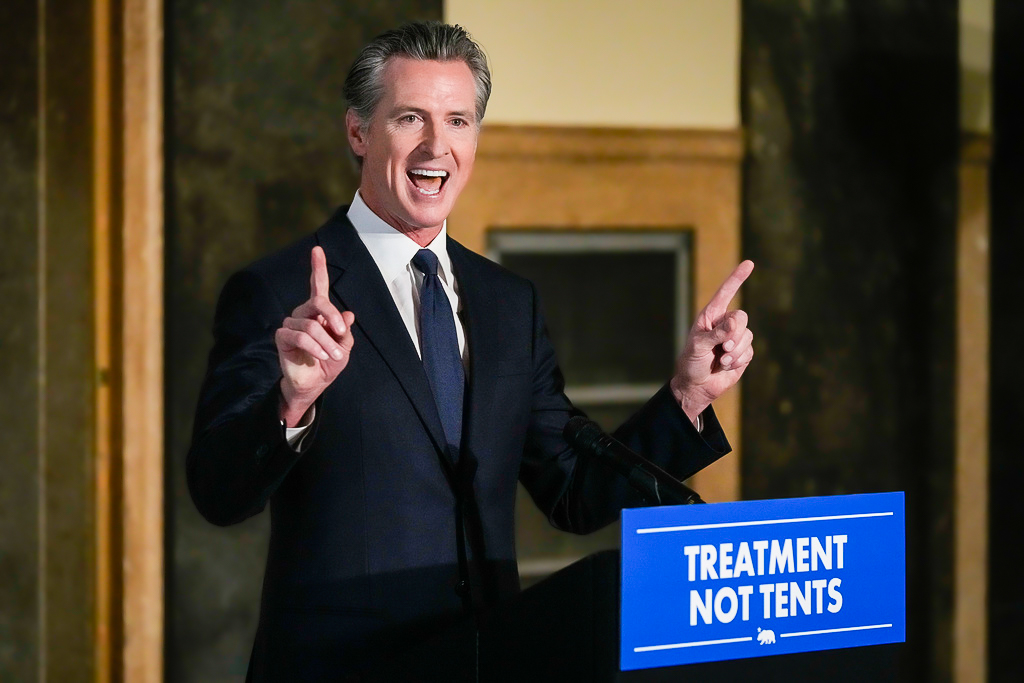Propelled by $26 million in donations, Gov. Gavin Newsom’s Proposition 1 promises a long-overdue modernization of how California funds its mental health system. Voters will decide March 5 whether to approve the two-part measure, authorizing $6.4 billion in bonds and reallocating an existing wealth tax revenue for treatment beds and supportive housing.
Prop. 1 is the only statewide measure on the ballot, and by last week had amassed $16 million in donations. By March 1, another $10 million rolled in, according to the California Secretary of State’s website. Opponents of the measure have raised $1,000.
The campaign’s tagline, “Treatment not Tents,” is an appeal to voters’ feelings about the state’s homelessness problem, which continues to swell despite the spending of $20 billion to solve the crisis over the past several years.
Many agree the current nexus of mental health, addiction, and homelessness requires a different approach, and supporters frame Prop. 1 as an urgent pivot toward prioritizing the “sickest of the sick” and finally putting a dent in the gaping need for housing and treatment.
At a January kickoff for the campaign, Los Angeles Mayor Karen Bass said, “We cannot separate these problems,” while L.A. Sheriff Robert Luna pointed to the estimated 42 percent of the LA County jail population currently suffering from mental illness.
“We need better alternatives,” he said.
Los Angeles County Supervisor Hilda Solis also championed the measure as an expansion of both community-based services and supportive housing.
Existing Programs at Risk
But mental health advocates and local leaders say Prop. 1 will raid existing services that keep vulnerable residents from falling into the trifecta of homelessness, addiction, and severe mental illness and give the state a blank check to double down on failed policy.
“It’s being billed as a cure for homelessness, and it really isn’t. It’s limiting the people who will be benefited, and ignoring the other needs,” Orange County Supervisor Doug Chaffee told The Epoch Times.
He said Prop. 1, if approved by voters, will interrupt years of progress in his community.
“I think over time that maybe, in effect, we'll see more people with homelessness than it takes out,” Mr. Chaffee said.
The measure is in fact two pieces of legislation in one: a retooling of the 2004 Mental Health Services Act, otherwise known as Prop. 63, a wealth tax that generates around $2 billion to $3 billion annually, and a $6.4-billion bond to fund treatment and housing for those with mental illness and substance abuse disorders.
According to the state’s nonpartisan Legislative Analyst’s Office, around $4.4 billion of Prop. 1’s bond money would go toward mental health care and drug or alcohol treatment facilities, with at least $1.5 billion of that flowing to local governments and tribes. The remaining $2 billion would go to a state program that funds new construction and transformation of existing structures like motels into supportive housing, with about half set aside for veterans.
The state estimates the bond would fund “up to” 4,350 housing units, with 2,350 set aside for veterans, and treatment facilities for about 6,800 others.
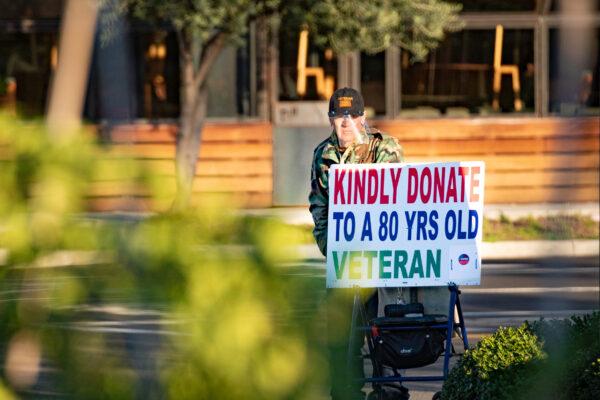
A veteran undergoing financial hardship asks for donations in Irvine, Calif., on Nov. 10, 2020. (John Fredricks/The Epoch Times)
There are an estimated 10,000 veterans among California’s 170,000 or so homeless. According to the Legislative Analyst’s Office, the bond would house more than 20 percent of them.
Currently, around 95 percent of tax revenue from the Mental Health Services Act goes directly to county programs. Prop. 1 would only reallocate around 5 percent of that to the state, but it would also impose requirements on how counties spend their funds, including 30 percent mandated to housing. Additionally, Prop. 1 would expand the target population to now include those who only have substance abuse disorders but not mental illness, whereas it has historically only included those with mental illness, or concurrent mental illness and substance abuse disorders.
“We can’t solve a monumental mental health and housing crisis by rearranging the very same dollars,” Karen Vicari, policy director for Mental Health America of California, an advocacy organization headquartered in Sacramento, which is leading the campaign against the measure, told The Epoch Times. “We need new dollars into the system if we want all people with mental health challenges to receive appropriate treatment.”
Historically, Ms. Vicari said the Mental Health Services Act has paid for services not funded by any other source. If Prop. 1 passes, she identified crisis respite centers—which provide temporary residential care for people suffering from mental illness—mental health urgent care, outpatient clinics, and consumer-run programs like wellness centers among those on the chopping block.
Those who rely on such services but might not qualify under new mandates imposed by Prop. 1 are at risk of slipping into homelessness, according to opponents of the measure. Others pointed to a shortage of healthcare professionals to staff new proposed facilities, an issue that doesn’t appear to be addressed by the proposition.
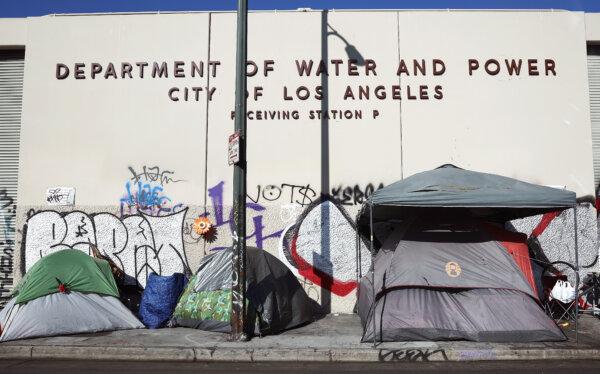
A homeless encampment stands in front of a city water and power building in the Skid Row community in Los Angeles on Sept. 28, 2023. (Mario Tama/Getty Images)
The Los Angeles County Department of Mental Health has also expressed “serious concerns” about Prop. 1, citing the drain it could put on existing programming.
Lisa Wong, the department’s director, told the nonprofit news outlet CalMatters in January the county spent nearly a third of its Mental Health Services Act budget on outpatient services last year, including psychiatric care and medication, and estimates it will only have 18 percent of such funding if the measure siphons some of that funding into housing.
“We are concerned that missing those service dollars might compromise the ability of people to stay in housing once they’re housed, or to get to a place of wellness where they can be successfully housed,” Ms. Wong said.
Loss of Local Flexibility and Efficiency
California’s counties have historically been the health and human service providers in the state, allowing them to disperse state and federal funding to address issues locally.
“We’re not the same as Los Angeles County, we’re not the same as San Francisco, we’re not the same as Imperial County,” San Diego County Supervisor Jim Desmond told The Epoch Times. “So we don’t want that broad brush solution that doesn’t work for the entirety of California.”
Some county leaders say their programs are already often hindered by the state’s refusal to fund them for more than a year at a time, and that complex issues like mental health and homelessness require consistent funding and multi-year efforts.
“Some of our programs will have to be cut. We’re already behind on this. We don’t want to be cutting programs,” Mr. Desmond said, adding that mental health money flowing to the counties will now have “strings attached,” like requirements to spend more on housing.
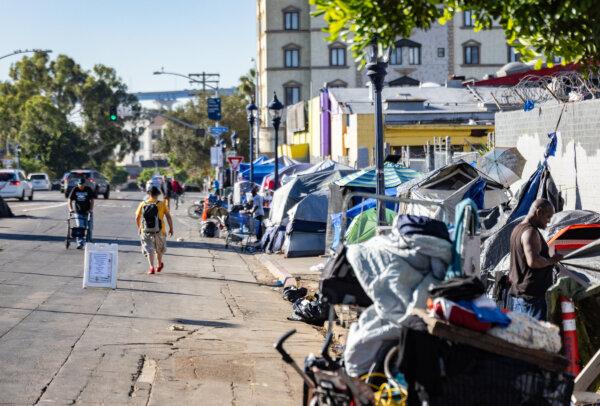
A homeless encampment in San Diego on Oct. 4, 2023. (John Fredricks/The Epoch Times)
Mr. Chaffee, the supervisor from Orange County, said Prop. 1 will fundamentally alter a system that has proven successful.
“In Orange County, we’re starting to move more and more toward prevention—I think that’s the way we’re going to shrink the homeless population,” Mr. Chaffee said. He characterized the Prop. 1 realignment as a misallocation of funds to “the wrong end of the homelessness spectrum,” toward more expensive measures that will help fewer people.
“The other thing is we lose control. More of the old funding will now go to Sacramento and they will direct programs. We’ll lose flexibility; we like to be flexible and be able to adjust as needed,” he said.
Some addiction recovery advocates, however, see the bond as an urgent investment in a different kind of infrastructure.
“They don’t make those arguments if we build a bridge or green space,” Stampp Corbin, president of the Los Angeles-based Addiction Treatment Advocacy Coalition, said of Prop. 1’s critics. “If it’s actually going to help a human being, then they have a problem with it.”
Mr. Corbin told The Epoch Times he especially supports the measure’s focus on veterans.
“If you go over to the VA Hospital [in Westwood], it’s horrible,” he said. “Veterans are going to the hospital for services and living in alleys up the street. So I’m glad a significant portion is for vets. This is just a step in the right direction.”
Taxpayers to Shoulder $310 Million Annually for 30 Years
But others argue it amounts to a multi-billion-dollar loan at high-interest rates—that will cost more than double to pay back and mostly benefit Wall Street lenders.
The bond money would be dispersed as grants, not loans, and taxpayers would be responsible for paying it back—around $310 million annually over the course of 30 years, which will come out of the state’s general fund.
State Sen. Roger Niello, who initially voted for SB 326, the part of Prop. 1 that updates the Mental Health Services Act, before turning against the overall measure, said he finds it frustrating that this crisis could have been addressed when the state was more in the black instead of when it’s facing a projected $73-billion deficit.
“We’ve known for years that we have a shortage of mental health beds. And we could have solved that during those flush budget years with what really in the context of those surpluses would have been budget dust,” Mr. Niello said. “We didn’t. Now all the money’s gone and all of a sudden now we’re going to do something about it and we’re going to virtually double our cost by borrowing the money and having to pay interest on it.”
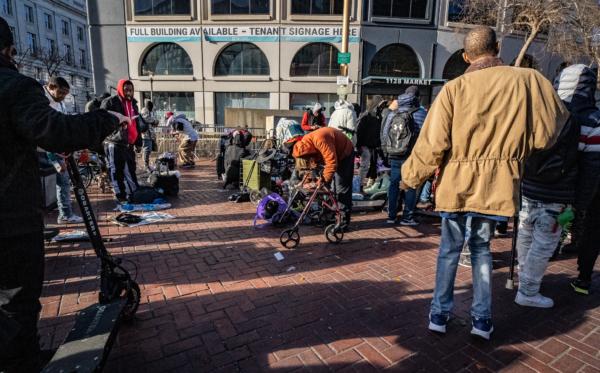
Homeless people gather near drug dealers in the Tenderloin District of San Francisco on Feb. 22, 2023. (John Fredricks/The Epoch Times)
The state has made big housing promises before. In 2018, its No Place Like Home program, known as Prop. 2, was financed with a $2-billion bond and promised 20,000 supportive units in five years, but has delivered less than 10 percent of that so far.
John Moorlach, a former California State Senator from Orange County who helped co-author that initiative, said Prop. 1 builds on that model and triples it.
“I think you need to let Prop. 2 work a little bit, then come back and see if you can match it, or double down. But tripling down now with a lot of changes in codes that impact local governments, that might not be the solution,” he said.
To many mental health professionals who have been working on these issues for decades, he said, the move feels a lot like “a pirate coming onboard and raiding the loot.”
Support for Prop. 1 among likely voters dropped from 69 percent to 58 percent between December to February, according to the Public Policy Institute of California. A poll completed by the Berkeley Institute of Government Studies last week showed support dropping to 50 percent, and further suggested results may be impacted by historically low turnout, which this year skews older and more Republican than usual.
A request for comment from Yes on Prop 1 - Governor Newsom’s Ballot Measure Committee, the main campaign behind the initiative, was not immediately returned.
